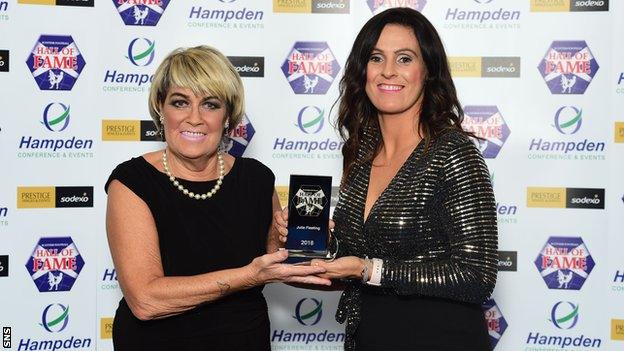Rose Reilly says Scotland caps 'better late than never' after 1972 match against England
- Published

Rose Reilly presented fellow former striker Julie Fleeting with her Scottish Football Hall of Fame award in 2017
Friendly international: Scotland v Jamaica |
|---|
Venue: Hampden Park, Glasgow Date: Tuesday, 28 May Kick-off: 19:35 BST |
Coverage: Live on BBC Alba, BBC Radio Scotland 810 MW and BBC Sport online |
Rose Reilly says "it's better late than never" as the Scottish FA prepares to hand out caps to those who played in Scotland's first women's international.
Reilly was only 17 when she played in a 3-2 loss to England in Greenock in 1972 despite a ban on women's football.
The former striker will receive her honour before Tuesday's friendly against Jamaica at Hampden Park.
"It's taken a long time," Reilly told BBC Scotland. "It was a different SFA when we were trying to play football."
Having played 10 times for Scotland, Reilly went on to appear 22 times for Italy after signing for AC Milan and helped her adopted country win the unofficial World Cup in 1984.
But Reilly, who was banned by the Scottish Women's FA along with team-mates Edna Neillis and Elsie Cook for criticising the national body, stressed that she remains a "very proud as a Scot" and that "playing for your country is the best thing in the world" .
"I eventually went professional and played for Italy because I realised Scotland didn't want me any more," the 64-year-old said. "I got banned because Scotland didn't want me. There was no communication."
A 1921 ban on women's football was not lifted until 1974 in Scotland - with the SFA taking control of the women's game in 1998.
"I thought it was ridiculous back then to say the least - they wouldn't even listen to us - we were completely cut off from the SFA," Reilly recalled.
"If they had a problem with us, it would have been better if they were speaking to us about it. My team-mates were miffed as well - we've just got the love of football, why should faceless men stop us from doing it?"
Reilly was inducted in to the Scottish Sports Hall of Fame and the Scottish Football Hall of Fame in 2007 and became the first female recipient of a special PFA Scotland Merit Award four years later.
She is now "happy for my team-mates who went so long without recognition", suggesting that, without Cook, who organised the game against England, "Scottish women's football wouldn't be in the place it was today".
"I was always wanting to play football but always getting obstacles in my way," she said. "The SFA just didn't agree with women's football - we weren't allowed referees, we weren't allowed on official pitches."
Present Scotland head coach Shelley Kerr, who is preparing her side for this summer's World Cup finals in France, says Reilly, Cook and their team-mates are "real legends and ambassadors".
"Their pathway into the game wasn't easy and I think it's important that, regardless of the time that's elapsed, they're recognised for their achievements because the females back then that played football have paved the way for the stars of the future and namely our teams," she said.
"So it's really, really important that, as an organisation, we recognise the hard work and we don't forget about the women that have paved the way playing football back where there was a certain stigma attached to it."